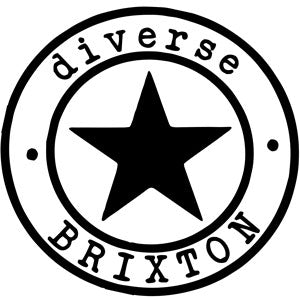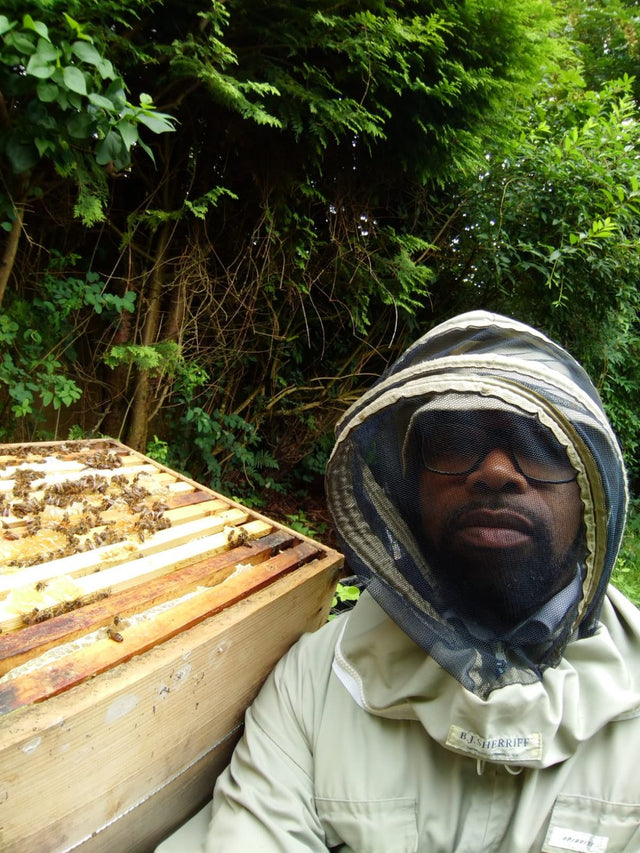Beekeeper, Moto Mheni
This post features one of the few Black beekeepers in the UK, Moto Mheni. We were so excited by his honey that we had to stock it at Diverse. Read about how he got started and his unique approach to beekeeping.
What inspired you to take up beekeeping?I took up beekeeping about eight years ago, while researching honey as an ingredient for our natural skincare business. My uncle told me that my grandfather had been a bee-keeper in Jamaica, so it’s clearly in the blood!
I did once consider giving it up in the early years when I got stung on my face, which ballooned and almost disfigured me. I was worried that I was allergic to bee stings. If I was, beekeeping would have been a life-threatening activity for me, and I would have had to give up before I’d barely started. Luckily, it turned out that I'm not allergic to bee stings, as the numerous scars on my hands and arms testify!
Please describe your beekeeping philosophy or approach.
The relationship I have with my bees is one of respect (for them) and therapeutic (for me). Once you’ve opened the hive, you enter their world; therefore my approach is not to raise their stress levels with whatever activity I am doing at the time.

What type of bees do you keep, and why did you choose them?
I keep the Buckfast bee. It’s the most common type found in Britain. It’s a hybrid strain developed from several breeds, in response to the threat of British honey bee extinction due to disease and harsh environmental conditions in the early 1900’s.
The bees in my apiary have the typical characteristics of the Buckfast strain, being mild in temperament, good honey producers, able to tolerate cold climates, and resistant to parasite mites.
How do you ensure the health and well-being of your bees?
My approach is: the less interference from me, the better. I carry out regular colony health inspections at specific times of the season - healthy queen, healthy hive!
I also ensure the health and well-being of my bees by managing potential swarms and by not being greedy at harvest time, to ensure the bees have enough stores for the winter. Apart from that, the bees just do their thing!
Can you briefly explain the process of honey production from hive to jar?
My bees are raised naturally without chemical treatments, antibiotics and/or GMO substitutes. The honey is extracted manually, double-filtered through stainless steel strainers, bottled without heat treatment (pasteurisation), and packed by hand into jars. This caring, responsible approach makes each jar of honey special.

What factors contribute to the flavour of your honey? Is there anything unique to the area where you have your hives?
The flavour of the honey is based on the nectar sources where the bees forage, and also the time of the season. One specific local source is the small-leaved lime tree. The nectar from it gives a zesty quality to the taste of the honey.
What are some of the challenges you face as a beekeeper and how do you overcome them?
My main challenge as a beekeeper is my on-going health condition which affects me twenty-four hours a day. I am partially paralysed in my neck, arms and legs. Fortunately, my sons help out. But there are also challenges from nature, such as marauding wasps and mice. As mentioned before, regular colony checks, plus natural pest control remedies, help to keep these threats at bay.
What do you find most rewarding about beekeeping?
The most rewarding thing about beekeeping for me is the positive feedback from those who have tasted my honey, especially from family elders abroad who say it reminds them of my grandfather’s honey.
What are your goals for your beekeeping business?
As well as being a small business, beekeeping is a meaningful therapeutic activity for me that allows me some relief from my debilitating health condition. Ideally, I’d like to move to somewhere where I could combine a home with enough land for the apiary, continue to grow produce, and pass on my knowledge to the next generation.
Finally, what is your favourite way to use honey in your daily life?
I mainly use my honey to add a certain quality to whatever I’m making, whether that’s cookies, bread, smoothies, porridge, a light drizzle on roasted salmon or in one of my herbal tea recipes.
Yum - that sounds delicious! Thanks to Moto for this fascinating insight into beekeeping. You can find his honey in our Brixton store or on our website here.

